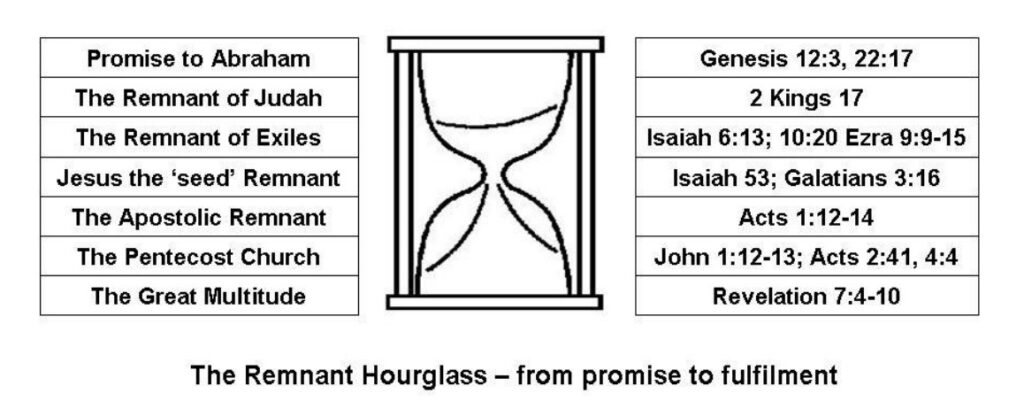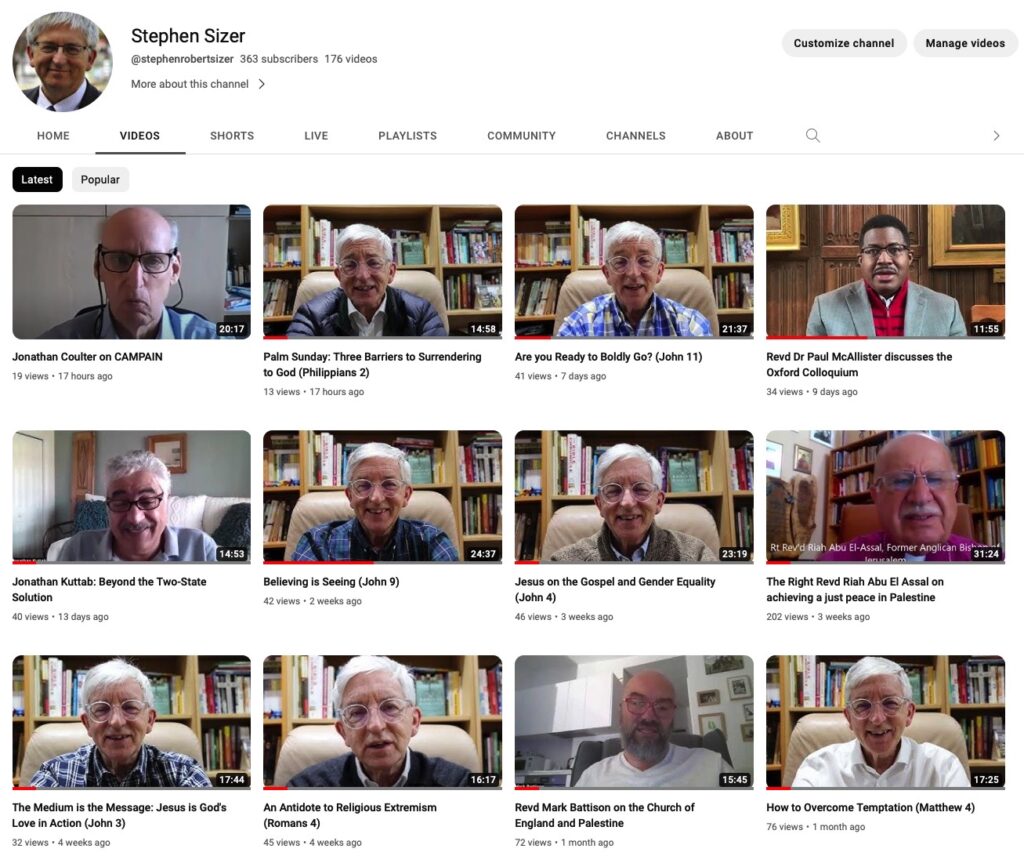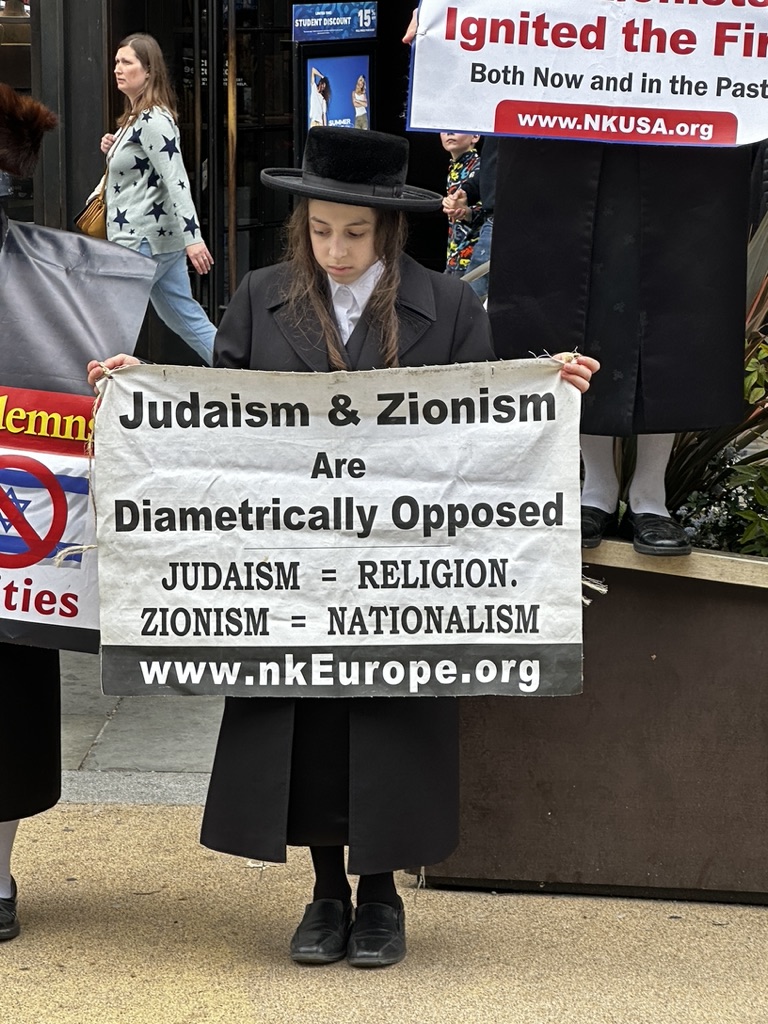An interview with Zeinab Al Saffar on Al Mayadeen TV, an independent pan-Arab satellite television channel based in Lebanon.
Author Archives: Stephen Sizer
The Cross and the Remnant: An Easter Meditation

When the Lord Jesus Christ died on the cross, how large was the remnant of Israel?
God had promised Abraham that his descendants would be like the stars in the sky and the sand on the seashore (Genesis 22:17-18). Through the history of God’s people recorded in the Hebrew Scriptures we see the Lord blessing and cursing his people according to their faithfulness (Deuteronomy 11:26-28; 2 Kings 17). Sent into exile first into Assyria and then into Babylon, on each occasion only a remnant returned.
So when Christ died on the cross, how large was the remnant? Where were the remnant who had acclaimed Jesus the Messiah just a week earlier on Palm Sunday? Where were the disciples? Where was Peter and the other Apostles? Who were present at the cross when Jesus died? Mary Magdalene, Mary his mother and the Apostle John. Did they understand what was happening? Were they singing ‘When I survey the wondrous cross”? No, they were weeping. They did not understand.
When Jesus died on the cross he was the sole remnant, the sole faithful remnant of Israel. This is crystal clear from Isaiah 53.
“Surely he took up our pain
and bore our suffering,
yet we considered him punished by God,
stricken by him, and afflicted.
5 But he was pierced for our transgressions,
he was crushed for our iniquities;
the punishment that brought us peace was on him,
and by his wounds we are healed.
6 We all, like sheep, have gone astray,
each of us has turned to our own way;
and the Lord has laid on him
the iniquity of us all.” (Isaiah 53:4-6)
Read verse 6 again. “We all, like sheep, have gone astray, each of us has turned to our own way and the Lord has laid on him the iniquity of us all.”
When Jesus hung on the cross he was Israel. The remnant was reduced to one man, who died and three days later was raised to new life. In the resurrection narratives we read how Jesus forgives, restores and recommissions his remnant. First, of his apostles (John 20-21), and then after his ascension and bestowing of the Holy Spirit, on the Day of Pentecost, three thousand people of many nationalities were added (Acts 2:41). By Acts 4:4, the remnant had grown to more than five thousand men.

The promises God made to Abraham have and are being fulfilled in and through the Church of Jesus Christ. The Book of Revelation provides a vision of there ultimate fulfilment.
“After this I looked, and there before me was a great multitude that no one could count, from every nation, tribe, people and language, standing before the throne and before the Lamb. They were wearing white robes and were holding palm branches in their hands. And they cried out in a loud voice:
“Salvation belongs to our God,
who sits on the throne,
and to the Lamb.” (Revelation 7:9-10)
Was the coming of Jesus the fulfilment or the postponement of the promises God made to Abraham? The Scriptures are clear:
Jesus answered, “I am the way and the truth and the life. No one comes to the Father except through me.” (John 14:6)
“Salvation is found in no one else, for there is no other name under heaven given to mankind by which we must be saved.” (Acts 4:12)
The remnant of God’s chosen people are saved by grace through faith and faith alone in the Lord Jesus Christ, not race, not law, not works, but grace through faith.
Easter Sunday: Christ is Risen! (John 20)
When you think of ‘membership’ what comes to mind? It probably depends on how exclusive or expensive the membership is, or how badly we want it. There are arts societies, sport associations, health clubs, university alumni and professional bodies. The list of ‘memberships’ is endless, and your wallet is probably full of plastic to prove it. Some memberships are open to anyone who can pay the fee while others are exclusive and by ‘invitation only’. For many people, their membership provides a rich social life in which friendships and common interests can be pursued and shared. What may surprise you, however, is to discover that ‘membership’ is a Christian word. It appears in the Bible to describe how we become members of God’s family. The apostle Paul writes,
“For just as each of us has one body with many members, and these members do not all have the same function, so in Christ we, though many, form one body, and each member belongs to all the others.” (Romans 12:4-5)
Continue readingArchbishop Mouneer on Peace Building and Conflict Resolution Teams for Egypt
In this interview, Archbishop Mouneer Anis of the Episcopal Anglican Province of Alexandria discusses a new initiative in partnership with the Rose Castle Foundation and Centre of Christian-Muslim Understanding and Partnership, helping to train teams of Christians and Muslins to form Peace Building and Conflict Resolution Teams to serve in Egypt.
The first team of Muslim and Christian leaders have now been trained and begun to initiate peace building projects. The need is great, especially in Upper Egypt.
The plan therefore is to train five further teams in 2023. The budget for this is modest – $16,000. If you would like to support this exciting project you may do so through the Friends of the Anglican Province of Alexandria (specifying your gift is for the Peace Building Team).
You can make a donation by bank transfer in UK Sterling directly to the FAPA account: Account No: 00018311 Sort Code: 40-52-40
Peacemaker trust is delighted to promote this exciting peacemaking project and hope that you will also.
In May 2022, Archbishop Mouneer Anis, First Archbishop of the Anglican Province of Alexandria, launched the Centre for Christian Muslim Understanding and Partnership at All Saints Cathedral in Cairo. The vision is to promote peace and harmony between faith communities through more understanding of faiths, cultures and through working together for the common good. Read more here.
Good Friday: The Death of Death in the Death of Christ (John 19)
The Cross. It struck fear in the hearts of the world. It was Rome’s ruthless means of control. Excruciating torture. Prolonged agony. Humiliating death. According to Roman custom, the penalty of crucifixion was always preceded by scourging. After this initial punishment, you carried your cross, or at least the transverse beam of it, to the place of execution. Besides the physical pain there was also the psychological torture. Because crucifixion was a public form of execution. The crosses were located by the roadside or at a crossroads. There was no hiding.
You were exposed to the jibes and insults of the people who passed by. Stripped naked, you were bound to the cross with cords and fastened with nails like these here. Roman nails, 2000 years old. Finally, a placard called the titulus bearing your name and your crime, was placed above your head. You would not die of hunger or thirst, but might hang on the cross for days. To breathe, you must stretch upward and stand to take the weight on your legs and off your arms and chest. So if your legs were broken, death would come mercifully swift from asphyxiation.
Continue readingMaundy Thursday: The Time Has Come (John 13)
Beat the clock. Around the clock. Against the clock. Clock in. Carry the day. Once in a blue moon. From now on. In the long run Come of age. A day in the sun. The crack of dawn. Year in, year out. A month of Sundays. Hour of need. Full of the joys of spring. Now or never. The moment of truth. Better late than never. Make my day. Here today and gone tomorrow. A blink of the eye. Days are numbered. What do they all have in common? Time. We say, long time no see. Killing time. Wasting time. Behind the times. On time. Just in time. As time goes by. The nick of time. Do time. Serve time. A whale of a time. Save time. Good time. Ahead of time. No time to lose. The big time. High time. Time is money. Times flies. Crunch time. Out of time. Time for a change. Times up. I counted over 100 expressions for time. They all refer to chronological or sequential time.
Palm Sunday: The King Has Come (Matthew 21:1-17)
2000 years ago Jerusalem was under a siege. One man set out on a lonely road to do something about it. Only 14 miles long. A day’s journey, up-hill, Jericho to Jerusalem. A one-way ticket. Jesus is out in front leading the way, setting the pace. Here is Mark’s eyewitness account:
“They were on their way up to Jerusalem, with Jesus leading the way, and the disciples were astonished, while those who followed were afraid. Again he took the Twelve aside and told them what was going to happen to him. “We are going up to Jerusalem,” he said, “and the Son of Man will be delivered over to the chief priests and the teachers of the law. They will condemn him to death and will hand him over to the Gentiles, who will mock him and spit on him, flog him and kill him. Three days later he will rise.” (Mark 10:32-34)
Continue readingJonathan Coulter on CAMPAIN and the Church of England
In this interview Jonathan Coulter explains the work of CAMPAIN and reasons for their recent Open Letter to the Archbishops of Canterbury and York.
You can read and sign the Open Letter here
Background to the Open letter:
Jonathan’s article “What is Wrong with the the IHRA working definition of antisemitism?“
View other YouTube interviews here

Palm Sunday: Three Barriers to Surrendering to God
Surrender is not a popular word, is it? Almost disliked as much as the word submission. It implies losing, and no one wants to be a loser. Surrender evokes unpleasant images of admitting defeat in battle, forfeiting a game, or yielding to a stronger opponent. The word is almost always used in a negative context. In today’s competitive culture we are taught to never give up and never give in. So, we don’t hear much about surrendering. If winning is everything, to surrender is unthinkable. We would rather dwell on winning, succeeding, overcoming and conquering not yielding, submitting, obeying, or surrendering. It is ironic then that surrender is at the heart of the Christian faith.
Palm Sunday is all about surrender. Jesus rode on a donkey not a horse. Jesus came in peace not war, to surrender not conquer. Jesus came to give his life as a ransom sacrifice, to be the Passover lamb, to make atonement with God. And when some in the crowd laid their coats on the ground, it was a sign of their surrender to him. Because surrender is the natural response to God’s grace and mercy. Our surrender is called many things in scripture: consecration, taking up your cross, dying to self, yielding to the Spirit, presenting ourselves as a living sacrifice. What matters is that we do it, not what we call it.
The New Antisemitism

Fifteen years ago, in September 2008, an anonymous ‘Mordechai Maverick’ sent a defamatory message about me to everyone in our church Facebook group. The message drew attention to a new but anonymous blog called Seismic Shock (intended apparently to sound like my name), which described me as a “dangerous anti- Semite” and promised to publish articles to expose me. The anonymous author(s) then began to write articles about me on a weekly basis, sometimes daily. These were subsequently re-posted on other websites such as Rosh Pina Projectand Harry’s Place. In a one year period September 2008-to July 2009 well over one hundred articles about me were published on the Seismic Shockwebsite.
Surrey police took an interest and provided me and my family with additional security. On 29th November 2009, I received a report from West Yorkshire Police to advise that they had identified and visited an individual and asked him to desist writing defamatory material about me and remove from his website material of that nature. I was asked to contact them if I became aware of further articles by the same individual “causing you harassment”. Despite the fact that at the time I did not know the name of the author, he subsequently went public and then accused me of using the police to suppress free speech on the internet.
Continue reading